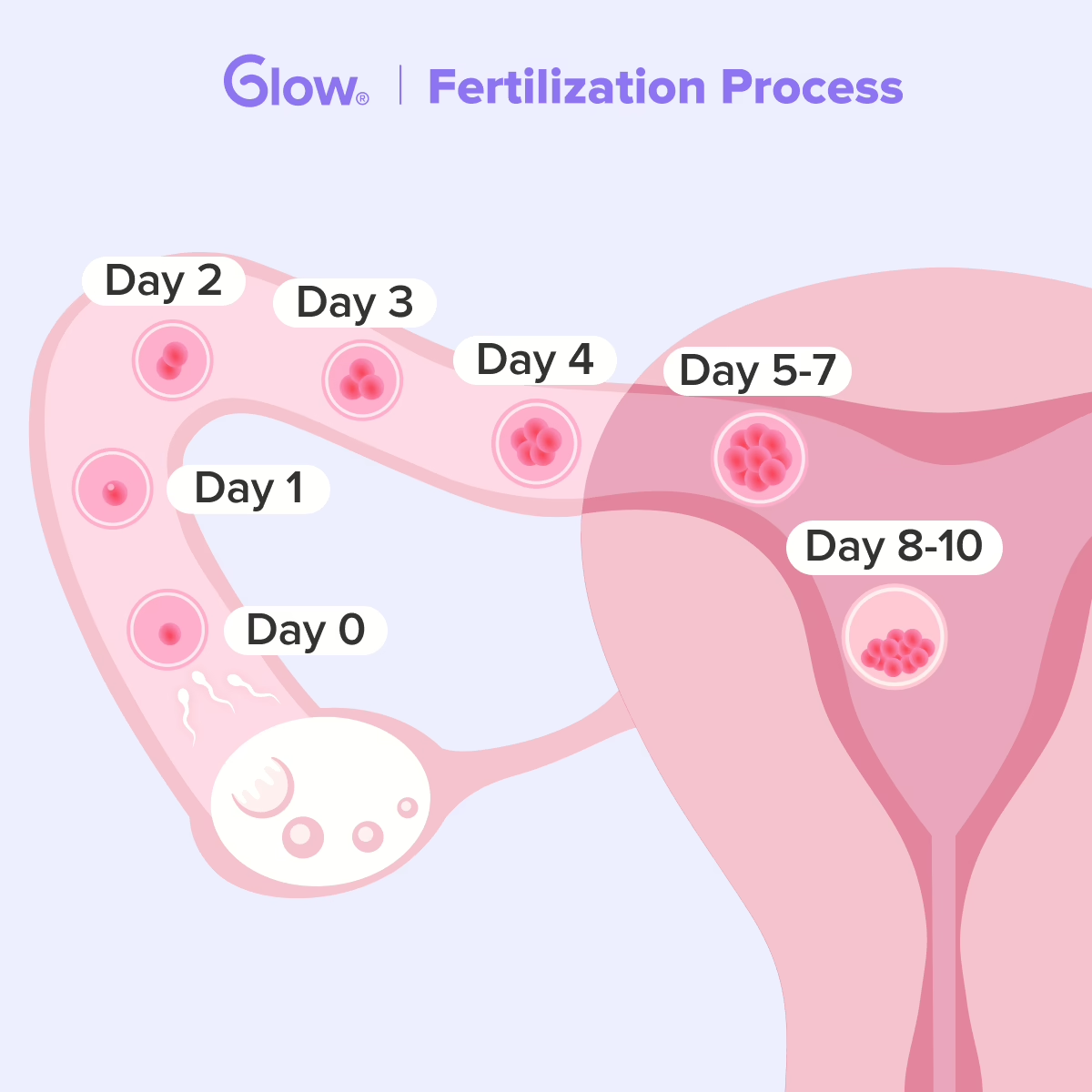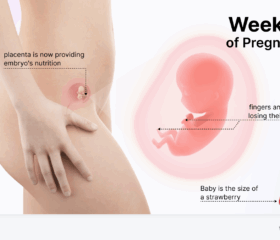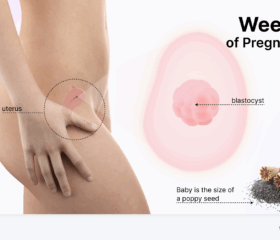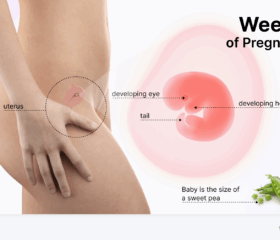Pregnancy Week by Week
3 Weeks Pregnant
Your baby is as big as a flake of finely ground pepper.

0.002
inches
3 Weeks Pregnant: Signs and Symptoms, Baby Development, and Tips
This period is infamously known as the “two-week wait” (TWW)—that suspenseful gap between ovulation and the point when a pregnancy test can confirm what you may already be hoping for.
You’re probably feeling a mix of emotions as you gear up to take your pregnancy test. In the meantime, there’s a lot you can learn about what could be happening in your body, as well as how to prepare for pregnancy and the months ahead.
You can be 3 weeks pregnant even if you just conceived
The pregnancy timeline that doctors use can be confusing. Pregnancy is typically counted from the first day of your last menstrual period (LMP). This approach to dating keeps everything consistent, but it often perplexes first-timers, since it means you can be on week 3 of your pregnancy even if you conceived just a few days ago.
What’s happening in your body at week 3
Here’s a brief breakdown of the initial stages of pregnancy and what may be happening in your body: 1
- Ovulation: In this stage, an egg is released from one of your ovaries, beginning its journey through the fallopian tube.
- Fertilization: Sperm travels up through your cervix and uterus to meet this egg in the fallopian tube. When a single sperm successfully penetrates the egg, fertilization occurs.
- Zygote formation: Fertilization causes the formation of a zygote with 46 chromosomes—23 from each parent. These chromosomes determine all of your baby’s genetic traits, from eye color to blood type.
- Zygote migration: The zygote travels down the fallopian tube toward your uterus. As it travels, it divides rapidly, forming a cluster of cells that will continue to multiply. Within a few days, this cell cluster will reach what’s known as the blastocyst stage, with cells differentiating to form the future embryo and placenta.
- Implantation: Once in the uterus, the blastocyst will eventually implant in the uterine lining. It will connect to your body’s nutrient supply, which will support it in the coming months.
By this point, if you’re pregnant, it means you’ve ovulated and conceived. However, your baby-to-be hasn’t implanted yet. Implantation typically occurs around 10 days after conception, though it can vary slightly from woman to woman. 2

Can you get a positive pregnancy test in week 3?
In week 3, it’s probably still too early for a home pregnancy test to detect your pregnancy.
Pregnancy tests work by detecting the presence of human chorionic gonadotropin (hCG), a pregnancy hormone that can be detected in your urine around 12–15 days after ovulation. 3
As a rule, if you’re wondering how early you can take a pregnancy test, wait until after you miss your period for accurate results. In fact, experts recommend waiting 1–2 weeks after your first missed period before you take a urine pregnancy test. 4
Your baby’s development in week 3
If you’re pregnant, your baby is a blastocyst, a tiny (but rapidly growing) clump of cells.
As these cells divide and multiply, they’ll split into two groups:
- Inner cells: These cells will soon become the embryo.
- Outer cells: These will eventually form your placenta, which will deliver oxygen and nutrients to your baby throughout your pregnancy.
At this point, the soon-to-be embryo is a tiny cluster of cells that would just barely be visible to the human eye. However, these early developments are already setting the foundation for every organ and body system that will form in the weeks ahead.

Early pregnancy symptoms and signs
At week 3, you may begin to notice some early pregnancy symptoms, although these vary widely, and it’s also possible you won’t feel anything at all just yet.
Here’s a breakdown of common signs that can indicate pregnancy.
Missed period
A missed period is often the first clear sign of pregnancy. However, at week 3, it’s too early to expect this—your period wouldn’t have been due yet anyway. By the time you miss your period, you’ll already be in week 4 or 5, depending on your menstrual cycle length.
Implantation bleeding
Some women experience light spotting, known as implantation bleeding, when the fertilized egg attaches to the uterine lining. 5 This spotting is usually much lighter than a period and lasts for just a day or two.
Mild cramping or abdominal pressure
As your body adjusts to your early pregnancy, you might feel mild cramping or a sense of “heaviness” or pressure in your lower abdomen. These sensations can be similar to menstrual cramps.
They’re caused by hormonal changes and increased blood flow to your pelvic area, and they signal the beginning of your uterine adjustments as your body prepares itself to receive and support the fertilized egg.
Bloating
Hormonal shifts can also cause bloating during pregnancy, making your abdomen feel slightly fuller. This can resemble the bloating some people experience before their periods and is caused by progesterone (a hormone released during pregnancy) beginning to affect your digestive system.
Tender breasts
Your hormonal changes will also begin preparing your body for breastfeeding. As a result, you might notice that your breasts feel more tender, swollen, or sensitive than usual. While you can’t do much to prevent breast pain during pregnancy, wearing a supportive bra can help you feel more comfortable.
Heightened sense of smell
Some women report that scents—including foods, perfumes, and ordinary household smells—seem more intense during the early stages of pregnancy. 6
This heightened sense of smell during pregnancy often goes hand-in-hand with morning sickness (nausea and vomiting). Don’t be surprised if certain scents send you running to the bathroom in a few weeks!
Mood changes
You may experience shifts in your mood or feel a bit more emotional. Yet again, this is similar to how you might feel in your premenstrual period, and it’s also caused by your surging hormones.
Nausea
Nausea (which, as mentioned, is known as morning sickness) is a well-known pregnancy symptom. It’s relatively rare in week 3, since your hormone levels probably won’t be high enough yet to trigger it, but some unlucky women start feeling queasy a little earlier than others. 7
If you experience nausea this early, try eating small, frequent meals throughout the day to keep your blood sugar stable. Foods like ginger, plain crackers, or toast can also help settle your stomach.
Metallic taste
It might seem strange, but a metallic taste in your mouth can be an early sign of pregnancy. This is one of the rarer symptoms on this list, especially this early. If you get it, don’t panic—it can be disconcerting, but it’s caused by your hormones affecting your taste receptors, and it’s completely normal. 8
High body temperature
If you’re keeping track of your basal body temperature (BBT), you may notice it remains elevated after ovulation. A consistently high BBT for more than 2 weeks can be an early indication of pregnancy, although it isn’t a guarantee.
Many of these symptoms also resemble PMS symptoms
Early pregnancy symptoms can closely resemble premenstrual syndrome (PMS). Both can cause cramping, bloating, mood swings, and tender breasts. Certain symptoms are stronger indicators of pregnancy, like heightened smell sensitivity and nausea, but ultimately, there’s no surefire way to tell the difference between PMS and pregnancy. The only way to confirm you’re pregnant is with a positive test.
Tips for week 3 of pregnancy
Taking care of yourself in these early days will set a strong foundation for a healthy pregnancy. Here are some practical steps to support both you and your developing baby.
1. Start taking a prenatal vitamin
Taking a daily prenatal vitamin with folic acid is very important. This supports fetal development and prevents neural tube defects, which are often caused by folic acid deficiency. 9 Look for a vitamin that also contains calcium and iron, as well as any other key nutrients your doctor recommends.
2. Focus on nutrient-dense foods
Load your plate with foods that are full of calcium, iron, and protein. In particular, your pregnancy diet should consist of meals with lots of:
- Dark leafy greens
- Lean proteins
- Dairy (or fortified alternatives)
- Whole grains
3. Stay hydrated
Your water intake is just as important as your diet. Staying hydrated may ease your digestive issues, and it’ll be necessary to support your body as it starts increasing your blood volume (a change that, in turn, will support your baby’s development). The usual advice from experts is to drink at least 8 cups of water per day, and your doctor may recommend ramping up even more once you’re past the early stages.
4. Avoid high-risk substances
To support your baby’s development, you may need to make some lifestyle changes. You should avoid consuming: 10 11
- Alcoholic beverages (you can’t drink wine or any other alcohol while pregnant)
- Caffeine
- Tobacco or other products with nicotine
- Any illicit drugs (e.g., cocaine, heroin, methamphetamine, and marijuana)
- Certain prescription medications
- Over-the-counter pain relievers (NSAIDs)
- Certain herbal supplements (e.g., goldenseal, ginseng, and black cohosh)
- High-mercury fish
- Unpasteurized dairy products and juices
- Undercooked or raw seafood, eggs, and meats
- Deli meats and processed meats (though you can still eat deli meat, including pepperoni, while you’re pregnant if you reheat it to 165ºF first)
- Artificial sweeteners
Some of these may be okay to consume in moderation, but not all experts agree on the recommended limits. For example, some say that it’s okay to drink coffee when you’re pregnant, but that you shouldn’t have more than 200 mg of caffeine per day (about 1–2 cups of coffee).
Now is the time to get familiar with foods to avoid during pregnancy. You may be surprised by what you learn. For example, in addition to laying off the coffee to reduce your caffeine consumption, you should also avoid eating too much chocolate. 12
If you need help quitting smoking or adjusting other habits, talk with a healthcare provider for support.
5. Be mindful of overheating
Avoid steam rooms, hot tubs, and other high-heat environments that raise your core temperature. Research shows that high heat exposure can negatively affect a pregnancy during any trimester, including at week 3 in the first trimester. 13
For similar reasons, if you’re active, stick to light exercise, and take precautions to stay cool. Avoid intense or strenuous activities until you discuss safe routines with your doctor.
6. Establish a consistent sleep routine
Your body is working hard, so getting quality rest is very important. Try setting a regular bedtime, minimizing screen time before bed, and creating a calm sleep environment to improve your sleep quality now and in the months ahead.
7. Manage stress and practice patience
The “two-week wait” can be a time of mixed emotions and anticipation. Try to manage your stress by focusing on self-care activities, like (light) exercise, meditation, or journaling.
Taking time to relax and talk with your friends or family members can also help you stay grounded during this waiting period.
What can you expect at your first prenatal appointment?
If it turns out you’re pregnant, congratulations! You should book your first pregnancy appointment with a doctor for around weeks 6–8 of your pregnancy.
During this visit, you can expect a:
- Thorough health assessment
- Review of your medical history
- Weight check
- Blood pressure check
Your doctor may also perform a blood test or ultrasound to confirm your pregnancy and establish a due date.
This appointment is a good time to ask any questions and discuss any concerns you have. Make sure you ask about vaccines—most women can and should get the flu shot while pregnant, but it’s worth checking whether there are others you’ll need.
If you can prepare these questions ahead of time, that’s great, but if you realize after the fact that you forgot to ask something, don’t worry. You’ll have lots of other prenatal appointments throughout your pregnancy.
You can also consider using a journal or a pregnancy tracker app to record any questions you have for your doctor next time. Some of the best pregnancy trackers can also keep track of your appointments, symptoms, and any changes to your health that you want to report.
Final thoughts
The 3rd week of pregnancy is a time of ups and downs. On one hand, if you’ve been trying to conceive for a while and you’re feeling the first prickles of what you suspect are early-pregnancy symptoms, it can be very exciting—but it can also be equally frustrating to have no way of confirming for sure.
Just do your best to take care of yourself (both physically and emotionally), and sit tight. With any luck, in a couple of weeks, you’ll see those two little lines you’ve been waiting for, and you’ll have already begun laying the foundation for a smooth, healthy pregnancy.
Article Sources
- MedlinePlus. "Fetal development" Retrieved June 23, 2025.
- Medical News Today. "Implantation symptoms: Signs, timeline, and testing" Retrieved June 23, 2025.
- U.S. Food and Drug Administration. "Pregnancy" Retrieved June 23, 2025.
- MedlinePlus. "Pregnancy Test" Retrieved June 23, 2025.
- Cleveland Clinic. "Implantation Bleeding" Retrieved June 23, 2025.
- Frontiers in Psychology. "Pregnancy and olfaction: a review" Retrieved June 23, 2025.
- BMJ Clinical Evidence . "Nausea and vomiting in early pregnancy" Retrieved June 23, 2025.
- Cleveland Clinic. "Am I Pregnant?" Retrieved June 23, 2025.
- Journal of Medical Screening. "Folic acid and neural tube defects: Discovery, debate and the need for policy change" Retrieved June 23, 2025.
- National Health Service. "Foods to avoid in pregnancy" Retrieved June 23, 2025.
- American Pregnancy Association. "Herbs and Pregnancy" Retrieved June 23, 2025.
- Nutrients. "Caffeine Intake throughout Pregnancy, and Factors Associated with Non-Compliance with Recommendations: A Cohort Study" Retrieved June 23, 2025.
- U.S. Centers for Disease Control and Prevention. "Clinical Overview of Heat and Pregnancy" Retrieved June 23, 2025.







